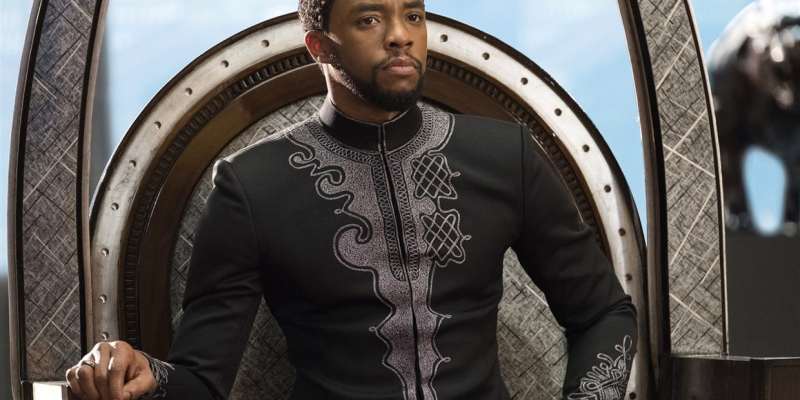Towards the end of Disney’s Investor Day, Kevin Feige confirmed that Marvel Studios would not recast the role of T’Challa in Black Panther 2, following the passing of actor Chadwick Boseman.
Boseman’s death was a shock to virtually everybody. The actor had worked hard to maintain his privacy in his final months and committed himself to his profession. Boseman worked right up until he couldn’t. He made a dazzling impression in Spike Lee’s Da 5 Bloods, released months before his death. His final major performance is yet to be released, a powerhouse supporting turn in the upcoming Netflix adaptation of August Wilson’s Ma Rainey’s Black Bottom.
In this context, it seems almost callous to talk about the inevitable sequel to Black Panther. After all, Boseman was far more than just King T’Challa, even if that role may have the greatest pop cultural staying power – which is no small thing in a career that saw Boseman playing real-life icons Jackie Robinson in 42, James Brown in Get On Up, and Thurgood Marshall in Marshall. Still, the realities of commerce are what they are. The wheels must turn. Black Panther 2 begins filming in July.
There was always going to be a debate about whether to retire the role of T’Challa following the passing of Chadwick Boseman. Some argued that it was important to recast the role, to allow the character of T’Challa to live beyond this single actor. After all, comic book fans are used to multiple iterations of familiar characters. As the casting reports remind us, Tom Holland is the third actor to play Spider-Man since the turn of the millennium, and that is only counting live-action adaptations.

More seriously, the argument for recasting can cite any number of examples to support it. Heath Ledger passed away before winning his Oscar for his performance as the Joker in The Dark Knight, but the Joker has subsequently been played in live action by actors like Cameron Monaghan, Jared Leto, and Joaquin Phoenix. None of these recastings diminish the influence or importance of Ledger’s performance. Fans still instantly recognize his interpretation of the character.
After all, the Marvel Cinematic Universe (MCU) has a history of recasting core roles. Don Cheadle replaced Terrance Howard as Rhodey in Iron Man 2. Ross Marquand succeeded Hugo Weaving as the Red Skull in Avengers: Infinity War. Mark Ruffalo stepped into the oversized purple pants to replace Edward Norton in The Avengers. It’s impossible to quantify a character’s worth to the shared universe, but the Hulk has to be roughly equivalent in importance to the MCU to Black Panther — and the Hulk was replaceable.
However, these arguments look at the issue as one of brand management and intellectual property. They assume that the character of T’Challa in the MCU can (or should) ever be divorced from the actor Chadwick Boseman. After all, however one might feel about his work on The Incredible Hulk, Edward Norton was replaced after one underperforming and middling-reviewed film. Norton is a great actor, but his take on Bruce Banner had nowhere near the cultural impact of Boseman as T’Challa.
The MCU has historically realized that some performances are inseparable from the characters they represent. When Robert Downey Jr. and Chris Evans decided that they were done with their time playing Tony Stark or Steve Rogers, Marvel did not respond to this by recasting the roles. Instead, the company shrewdly understood that – to an entire generation – Downey and Evans were Tony Stark and Steve Rogers. They were irreplaceable. Chadwick Boseman deserves the same respect.

After all, for all that various actors played the role of the Joker after the tragic passing of Heath Ledger, they all played different iterations in different continuities. Christopher Nolan did not recast the role for The Dark Knight Rises, instead structuring the film to emphasize the Joker’s absence. (His fate is suggested in Greg Cox’s tie-in novel.) It’s notable that this absence allowed for Tom Hardy to step into the role of Bane, becoming a breakout character in his own right.
The primary argument for recasting is that Black Panther should be bigger than one actor. That is not unreasonable, given how much the franchise means to audiences. However, there are other ways to acknowledge that beyond recasting the role of T’Challa. After all, Chris Evans’ retirement from the MCU has not left the universe without a Captain America, with the character of Sam Wilson (Anthony Mackie) assuming the mantle in his stead.
Black Panther is better suited for this than other franchises. The Black Panther is a title passed from one person to another. Black Panther has one of the deepest ensembles in the MCU, and there are any number of characters who could take over the role. Shuri (Letitia Wright) assumed the mantle in the comics. Nakia (Lupita Nyong’o) and Okoye (Danai Gurira) are also viable candidates, given the controversy around Wright.
Any of the three would give the MCU its first female black lead, which would be a fitting tribute to Boseman’s legacy. Black Panther was not the first black superhero movie, but it was trailblazing in terms of representation and profile. After all, Boseman’s performance in Black Panther meant so much to young black audiences because it was the first time that many children had seen somebody who looked like them in so central a role.

Indeed, this gets at perhaps the final and most persuasive argument for retiring T’Challa. Boseman was not an anonymous cog in a vast corporate machine that could be swapped out so easily. Proponents of recasting might argue that replacing Boseman would keep T’Challa vital and part of the fabric of the shared universe, but it’s hard to imagine that Disney would continue putting Boseman’s face on lunchboxes or action figures once another actor took the role.
Boseman is not merely a T’Challa in the same way that Edward Norton is a Bruce Banner. Boseman is T’Challa. Whatever minor monkey wrench this might throw into the flow of the shared universe is a small price to pay to acknowledge that. Children will understand why T’Challa has been retired. Many worked their own process of grieving the character already, staging mock funerals with action figures. Kids are media-literate. They understand these movies are fiction, but Boseman was real.
Disney’s Investor Day was in many ways a demonstration of the driving force of intellectual property and brand management in this modern era, from a reboot of Chip ‘n Dale: Rescue Rangers through to the weird reverse-engineering of Buzz Lightyear as an established brand by making the movie from which the Toy Story character was a licensed product. As such, it was nice to close with a tacit acknowledgement that, sometimes, people are irreplaceable.
